|
|
|
Sort Order |
|
|
|
Items / Page
|
|
|
|
|
|
|
| Srl | Item |
| 1 |
ID:
159291
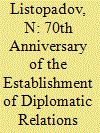

|
|
|
|
|
| Summary/Abstract |
ALL COUNTRIES in the world are special and unique. However, every state is unique in its own way. One of the most unique and interesting countries is Myanmar, or the Republic of the Union of Myanmar, prior to 1989 known as Burma.
|
|
|
|
|
|
|
|
|
|
|
|
|
|
|
|
| 2 |
ID:
159273


|
|
|
| 3 |
ID:
159284


|
|
|
|
|
| Summary/Abstract |
IN THE UNITED STATES in the second half of the 20th century, two models that directly contradict each other in content could be distinguished in political conflictology as a branch of political science whose specialists regularly advise government circles. Since the authors of these models did not simply influence but frequently predetermined the foreign policy of the United States, we can also speak of the lines of American foreign policy based on these models.
|
|
|
|
|
|
|
|
|
|
|
|
|
|
|
|
| 4 |
ID:
159283
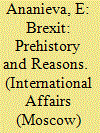

|
|
|
|
|
| Summary/Abstract |
Bargaining is a repulsive habit; compromise is one of the highest human virtues.
|
|
|
|
|
|
|
|
|
|
|
|
|
|
|
|
| 5 |
ID:
159276
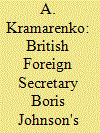

|
|
|
|
|
| Summary/Abstract |
BORIS JOHNSON, British Secretary of State for Foreign and Commonwealth Affairs, made a working visit to Moscow on December 22, 2017, during which he and his Russian counterpart Sergey Lavrov held talks on a wide range of issues on the bilateral agenda and relevant international topics. Regarding the results of the talks, both ministers spoke at a joint press conference of the need to restore mutual trust, and how the current state of relations between Moscow and London can in no way be called satisfactory. Hence the mutual desire for more effective collaboration in the international arena; in addition, the status of Russia and Britain as permanent members of the UN Security Council requires both this and the restoration of certain norms in bilateral relations. Johnson's visit was the first trip to Russia by a British foreign secretary in the last ten years. Why have there been no normal relations between Russia and Britain in recent years?
|
|
|
|
|
|
|
|
|
|
|
|
|
|
|
|
| 6 |
ID:
159282


|
|
|
|
|
| Summary/Abstract |
REFORMING the global governance system to make it more efficient is a top item on the world's agenda. It is essential not only for dealing with various global issues but also for developing the rules and course for the international order and system. It is not only pivotal to the vital interests of all countries, and it is not only a matter of prosperity or decay and life and death of a nation. More importantly, it is a factor of global peace, stability, development, and prosperity, and can be described as the core of our times, something that affects all nations. Although globalization, the development of multipolarity and information technology (IT) penetration are key trends in today's world and are rapid processes, global governance still lacks efficient mechanisms for dealing with serious challenges. There are various reasons for this.
|
|
|
|
|
|
|
|
|
|
|
|
|
|
|
|
| 7 |
ID:
159286
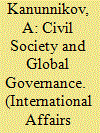

|
|
|
|
|
| Summary/Abstract |
THE WORLD faces a range of problems, among them new infectious diseases, growing poverty, environmental pollution, climate change, depletion of vital non-renewable energy resources, and dwindling reserves of drinking water. These problems affect everyone in the world and cause wide-scale concern, with civil society being one of the channels through which such concern is expressed.1 It is increasingly often argued that such problems cannot be solved without a system of global governance that would be based on values shared by people of all cultures, political views, religious beliefs, and philosophical principles. Not accidentally, this is one of the issues on the agenda of the United Nations - the organization has a specialized body for this purpose, the Commission on Global Governance.
|
|
|
|
|
|
|
|
|
|
|
|
|
|
|
|
| 8 |
ID:
159292
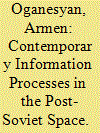

|
|
|
| 9 |
ID:
159274
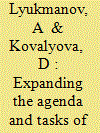

|
|
|
|
|
| Summary/Abstract |
THE UNINTERRUPTED ESCALATION of the threat of international terrorism; its expansion under the banner of so-called "political Islam" on the territories of the Near East and North Africa, and of South and Southeast Asia; and its penetration into Europe and Central Asia have shown that the core of the radicalization of hundreds of thousands (if not millions) of people, and of their involvement in the cruelest and most violent of crimes on the greatest of scales, is primarily the terrorist ideology - an overarching, universal, all-encompassing, and extremely effective, inexpensive, and accessible instrument of mobilization, recruiting terrorists, planning terrorist attacks, undermining public safety and political security, destabilizing governments and law and order, and furthering terrorist aims.
|
|
|
|
|
|
|
|
|
|
|
|
|
|
|
|
| 10 |
ID:
159272


|
|
|
|
|
| Summary/Abstract |
No doubt, the Battle of Stalingrad, which was the turning point in the Great Patriotic War of 1941-1945 and WWII in general is part of the key events in world history. It became a vivid manifestation of the courage, fortitude, and self-sacrifice of all the peoples of the former Soviet Union, which thwarted the criminal, evil intentions of the Nazis and prevented a global catastrophe. We owe a huge debt of gratitude to the heroes.
|
|
|
|
|
|
|
|
|
|
|
|
|
|
|
|
| 11 |
ID:
159277


|
|
|
|
|
| Summary/Abstract |
The centuries-long history of Russian diplomacy counts many splendid victories and glorious names. Today, guided by the good traditions of the past, the Foreign Ministry's employees show their worth in defending our national interests.
|
|
|
|
|
|
|
|
|
|
|
|
|
|
|
|
| 12 |
ID:
159285


|
|
|
|
|
| Summary/Abstract |
INTERNAL political conflicts, the exponential growth of which began long before the 21st century started, have been and remain one of the gravest challenges to the world community. Contrary to the widespread opinion, in the 19th and the first half of the 20th centuries, the number of violent internal political conflicts prevailed over interstate armed confrontations. After World War II, the trend became obvious: today, there are much more internal political than interstate armed conflicts in the world.
|
|
|
|
|
|
|
|
|
|
|
|
|
|
|
|
| 13 |
ID:
159288


|
|
|
|
|
| Summary/Abstract |
MUCH of what is said and written about international information security amounts to alarmist predictions that the use of high technology to destabilize the current world order will continue to grow in scale. With all respect for those who make such predictions, it has to be admitted that it's too late to start getting anxious - what they are foretelling has already happened. Cybersecurity issues are dealt with on the front pages of newspapers and the homepages of websites, and are high on agendas for relations between countries.
|
|
|
|
|
|
|
|
|
|
|
|
|
|
|
|
| 14 |
ID:
159290


|
|
|
|
|
| Summary/Abstract |
WHEN Australia's Minister for External Affairs, HV "Doc" Evatt, and his Soviet counterpart, Vyacheslav Molotov, met to establish diplomatic relations in London on 10 October 1942, the course of the Second World War was by no means determined. At that time, we were allies against Hitler's Germany.
|
|
|
|
|
|
|
|
|
|
|
|
|
|
|
|
| 15 |
ID:
159287


|
|
|
|
|
| Summary/Abstract |
International Affairs: The Russian Foreign Ministry's Chief Administration for Services to the Diplomatic Corps (GlavUpDK) has a rich history. How did it all start? What evolutionary path has GlavUpDK traversed in these nearly 100 years? What was it like getting through the collapse of the Soviet Union and the turmoil of the wild 1990s?
|
|
|
|
|
|
|
|
|
|
|
|
|
|
|
|
| 16 |
ID:
159275


|
|
|
|
|
| Summary/Abstract |
THE CREATION of the United Nations marked the end of the World War II and showed the entire world community the way to the peaceful diplomatic settling of conflicts. The work of the organization, created in 1945. was not limited exclusively to questions of war and peace. Prominent among the organization's aims, as laid down in its charter, was its creators' desire to strengthen international cooperation, raise the role of diplomacy, and establish dialogue in the processes of international relations.1 It should be noted here that the area of debate open to the representatives of the UN member countries was formulated to solve a wide variety of problems of the most diverse nature.
|
|
|
|
|
|
|
|
|
|
|
|
|
|
|
|
| 17 |
ID:
159289


|
|
|
|
|
| Summary/Abstract |
DESPITE their different geographical positions - one being a continental and the other an insular country - Russia and Japan are close neighbors. They are divided only by several kilometers of water, while bound together by an extensive network of ties and cooperation.
|
|
|
|
|
|
|
|
|
|
|
|
|
|
|
|
| 18 |
ID:
159279


|
|
|
|
|
| Summary/Abstract |
GLOBAL POLITICS today are faced with a lot of new challenges and international security threats. Domestic and foreign media outlets daily report new developments regarding tensions in Russia-U.S. interstate relations; sharp confrontation with mutual threats to use nuclear weapons between North Korea, on the one hand, and the United States, South Korea and Japan, on the other; a serious worsening of interstate relations between certain EU member countries, as well as of the stability of this interstate union as such; the successful military operations of the Syrian Armed Forces with support from the Russian Aerospace Forces in antiterrorist operations against ISIS and its allies, and a new political crisis in Ukraine.
|
|
|
|
|
|
|
|
|
|
|
|
|
|
|
|
| 19 |
ID:
159278
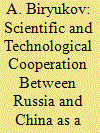

|
|
|
|
|
| Summary/Abstract |
IN OCTOBER of last year, events took place in China and Russia that were highly significant although not comparable in scale - the 19th National Congress of the Communist Party of China (CPC) and a session of the Valdai International Discussion Club. There was something that those events had in common - attention paid by the leaderships of the two countries to scientific and technological progress as an extremely powerful factor in the national development and international politics of these great powers.
|
|
|
|
|
|
|
|
|
|
|
|
|
|
|
|
| 20 |
ID:
159293


|
|
|
|
|
| Summary/Abstract |
ON MAY 26, 1942, in London, Vyacheslav Molotov, People's Commissar for Foreign Affairs of the USSR, and Anthony Eden, Secretary of State for Foreign Affairs of Great Britain, signed the Anglo-Soviet Treaty of Alliance in the War Against Hitlerite Germany and Its Associates in Europe and of Collaboration and Mutual Assistance thereafter for 20 years. This treaty was "designed to confirm the stipulations of the agreement between His Majesty's Government in the United Kingdom and the Government of the Union of Soviet Socialist Republics for joint action in the war against Germany signed at Moscow, July 12, 1941." It was said in the new treaty that "the high contracting parties mutually undertake to afford one another military and other assistance and support of all kinds in war against Germany and all those States which are associated with her in acts of aggression in Europe... and undertake not to enter into any negotiations with the Hitlerite Government or any other government in Germany that does not clearly renounce all aggression intentions, and not to negotiate or conclude, except by mutual consent, any armistice or peace treaty with Germany." The Treaty signed by the foreign ministers of both countries expanded the temporal limits of allied relations and created a potential legal basis of further cooperation: "The high contracting parties, having regard to the interests of security of each of them, agree to work together in close and friendly collaboration after re-establishment of peace... take into account the interests of the United Nations ... and act in accordance with the two principles of not seeking territorial aggrandizement for themselves and of non-interference in the internal affairs of other States."
|
|
|
|
|
|
|
|
|
|
|
|
|
|
|
|
|
|
|
|
|